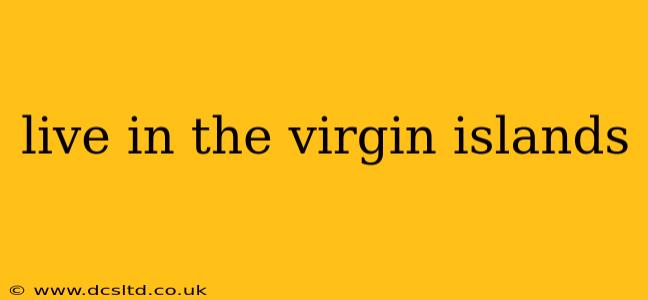Living in the U.S. Virgin Islands: Paradise Found? A Comprehensive Guide
The U.S. Virgin Islands (USVI)—comprising St. Croix, St. John, and St. Thomas—conjure images of pristine beaches, turquoise waters, and a relaxed Caribbean lifestyle. But what's it really like to live there? This in-depth guide explores the realities of life in this idyllic archipelago, addressing common questions and concerns.
What is the cost of living in the Virgin Islands?
The cost of living in the USVI is significantly higher than the U.S. mainland average. Housing, particularly on St. Thomas and St. John, is exceptionally expensive, often exceeding mainland prices by a considerable margin. Groceries and imported goods also command higher prices due to reliance on shipments. While some locally sourced produce can be more affordable, the overall cost of daily necessities can quickly add up. This is a crucial factor to consider before making the move. You'll need a robust budget to comfortably maintain a lifestyle in the islands.
What are the job opportunities like in the Virgin Islands?
Job opportunities in the USVI are concentrated primarily in tourism, hospitality, and government sectors. While there are opportunities in other fields, competition can be fierce, and salaries may not always reflect mainland equivalents. Many residents supplement their income through entrepreneurial ventures, often catering to the tourist market. Networking and building connections within the community are vital for finding employment.
What are the pros and cons of living in the U.S. Virgin Islands?
Pros:
- Stunning natural beauty: The islands boast unparalleled natural beauty, with breathtaking beaches, lush rainforests, and vibrant coral reefs. Outdoor recreation opportunities abound, from snorkeling and diving to hiking and sailing.
- Relaxed lifestyle: The pace of life is generally slower and more relaxed than on the mainland. There's a strong emphasis on community and enjoying the outdoors.
- Tax benefits: The USVI offers certain tax advantages, but it's important to consult with a tax professional to understand the nuances and implications.
- US Citizenship: Residents are U.S. citizens, enjoying all the associated rights and privileges.
Cons:
- High cost of living: As previously mentioned, the cost of living is significantly higher than the U.S. mainland average.
- Limited job opportunities: Finding suitable employment can be challenging, and salaries may be lower than mainland counterparts.
- Hurricane risk: The islands are located in a hurricane-prone zone, posing a significant risk to property and safety. Hurricane preparedness is crucial.
- Infrastructure challenges: Infrastructure can be less developed than on the mainland, leading to potential issues with utilities and transportation.
What is the culture like in the Virgin Islands?
The USVI boasts a rich and diverse culture, blending influences from Caribbean, European, and African heritage. The islands are known for their vibrant music scene, delicious cuisine (often featuring fresh seafood), and friendly, welcoming people. English is the official language, but you'll also hear Creole and Spanish spoken frequently. Immersing yourself in the local culture is a rewarding aspect of living in the islands.
Is it easy to get around the Virgin Islands?
Getting around the islands can be challenging, particularly on St. John and St. Thomas, where public transportation can be limited. Many residents rely on personal vehicles, though parking can be difficult in popular areas. Ferries connect the three main islands, providing a convenient way to travel between them.
How safe is it to live in the Virgin Islands?
Like any other location, the USVI has its share of crime. While generally safe, it's important to be aware of your surroundings and take necessary precautions, especially at night. Staying informed about local crime statistics and adhering to common-sense safety measures is advisable.
What are the schools like in the Virgin Islands?
The USVI public school system offers education from kindergarten through high school. There are also several private schools catering to diverse educational needs. The quality of education can vary, and many parents supplement their children's schooling with extracurricular activities or tutoring.
Living in the U.S. Virgin Islands offers a unique and alluring lifestyle, but it's essential to approach it with realistic expectations. Thorough research, careful planning, and a robust financial foundation are crucial for a successful and fulfilling experience. Weighing the pros and cons carefully is vital before making such a significant life decision.
